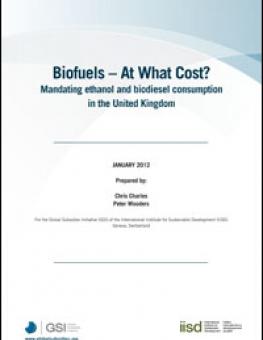
Biofuels - At What Cost? Mandating ethanol and biodiesel consumption in the United Kingdom
The U.K. government is currently considering what policies will ensure it meets the European Union's Renewable Energy Directive (RED) commitment of using 10 per cent by energy of renewable transport fuels by 2020.
Current U.K. policies concerning the blending of biofuels with petroleum fuels may not deliver the required level of biofuels within the U.K. transport fuels market.
This study examines the potential fiscal burden on the U.K. government and the additional costs imposed on consumers and other sections of the economy if the U.K.'s blending mandate of 4 or 5 per cent (in 2011/12) was increased to 10 per cent or 15 per cent in order to satisfy the EU's renewable transport target. A number of important areas listed below were investigated and, where possible, an estimate of the potential costs provided.
- The evolution of the U.K.'s biofuels industry and its current and planned production capacity
- Support programs to develop advanced biofuels for the transport sector
- Agricultural subsidies provided to the producers of biofeedstocks under the CAPs Single Payment Scheme
- Government agency costs for administering the U.K.'s Renewable Transport Fuel Obligation (RTFO)
- Changes in tax revenues if the U.K. government reintroduced tax exemptions in order to reduce the price of biofuels in relation to fossil fuels
- Handling expenses met by fuel retailers in order to deliver blended fuels to consumers
- Upward pressure on consumer prices from more expensive biofuel blended with cheaper fossil fuels sold onto consumers
- Engine damage resulting from the use of blended fuels
You might also be interested in
Policy Watch: UK's windfall tax shows why the drive to stop fossil fuel subsidies is still stuck in first gear
When the UK government announced a windfall tax on oil and gas companies to partly offset soaring household fuel bills in May, it sweetened the pill with a tax break on new oil and gas production.
UK must provide real climate leadership
While the UK talks tough, its agencies have continued to plough public funds into fossil fuels, writes Angela Picciariello.
Doubling Back and Doubling Down: G20 scorecard on fossil fuel funding
This study tracks, for the first time, each G20 country's progress on ending support for fossil fuels—ranking their transparency, commitments, and financial support to oil, gas, and coal.
It’s Official: The United Kingdom is to subsidize nuclear power, but at what cost?
A review of planned subsidies to the proposed Hinkley Point C nuclear power plant in the United Kingdom.